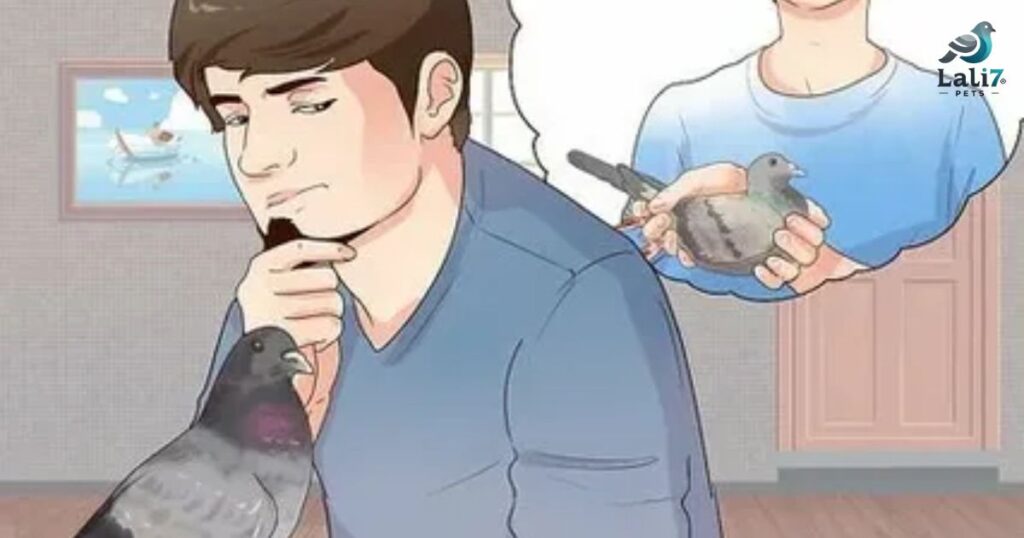Pigeons have always lived close to people. From ancient messengers to modern-day pets, these loyal birds have fascinated humans for centuries. Whether you’ve rescued one from the street, adopted a pet pigeon, or simply want to understand their needs, knowing how to take care of a pigeon is essential for its health and happiness.
This in-depth guide covers housing, feeding, bonding, baby pigeon care, injured pigeon recovery, and legal considerations, with real anecdotes and step-by-step advice to help you become confident in pigeon care.
- How to Take Care of a Pigeon at Home
- How to Take Care of a Pigeon for Beginners
- How to Take Care of a Pigeon Indoors
- How to Take Care of a Pigeon Female
- How to Take Care of an Injured Pigeon
- Is It Legal to Keep Pigeons as Pets?
- Pigeon Care and Feeding
- Pet Pigeon: Bonding and Enrichment
- Daily Step-by-Step Pigeon Care Routine
- Why You Should Feel Confident in Pigeon Care
- FAQ: How to Take Care of a Pigeon
- Final Thoughts
How to Take Care of a Pigeon at Home
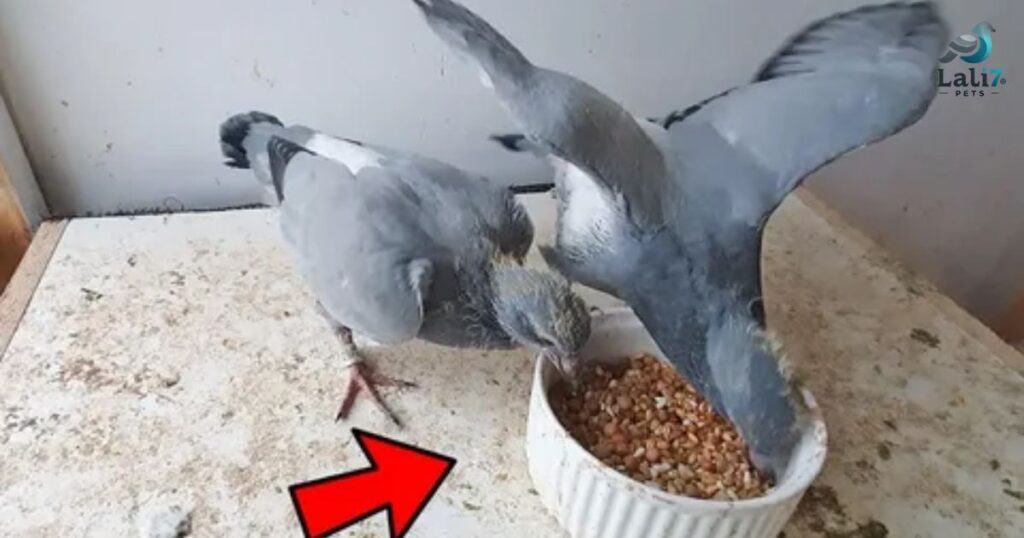
Caring for a pigeon at home is different from observing them in the wild. They need safe housing, fresh food, clean water, and attention.
- Loft or Cage Setup: Choose a spacious pigeon loft or large cage. A single pigeon should have at least 4 cubic feet of space.
- Ventilation: Fresh air is crucial, but avoid drafts.
- Hygiene: Clean droppings daily and disinfect weekly.
Anecdote: When I first built a loft for my pigeons, I underestimated how quickly droppings pile up. Within days, the smell reminded me that cleaning is just as important as feeding.
For designs, explore detailed pigeon loft blueprints.
How to Take Care of a Pigeon for Beginners
If you’re new to pigeon keeping, start simple:
- Begin with one or two pigeons. Managing a large flock can be overwhelming.
- Buy commercial pigeon feed instead of mixing your own.
- Set a routine: Feed at the same time each day.
- Observe behavior: Droppings, feathers, and activity levels show if your pigeon is healthy.
Story: A friend of mine, a beginner, panicked when his pigeon stopped eating one evening. It turned out the bird was just stressed from being moved into a new cage. Routine and patience solved the problem.
How to Take Care of a Pigeon Indoors
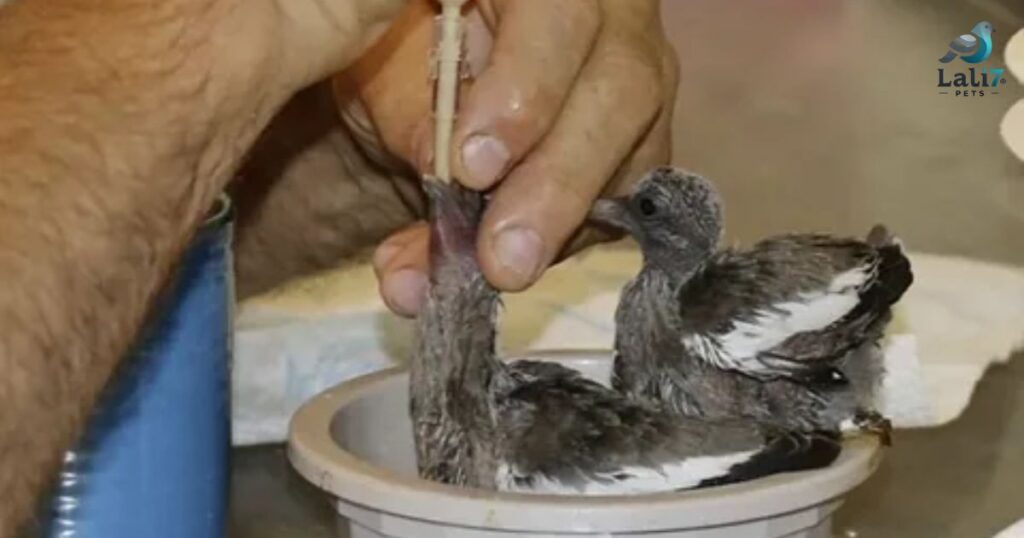
Some people keep pigeons indoors as pets, especially when rescuing injured or domesticated breeds.
- Housing: Use a large dog crate or bird aviary. Avoid wire flooring, pigeons prefer flat surfaces.
- Noise Control: Pigeons coo frequently. If kept in bedrooms or small apartments, be prepared for daily sounds.
- Cleaning: Indoor pigeons produce a lot of dust and droppings. Place newspaper or liners for easy cleaning.
See tips from Palomacy Pigeon Rescue for safe indoor pigeon housing.
How to Take Care of a Pigeon Female
Female pigeons need special attention, especially during breeding.
- Nesting Box: Provide a private space for egg-laying.
- Calcium Supplements: Prevents weak eggshells. Use mineral grit or cuttlebone.
- Resting Periods: Avoid overbreeding by separating pairs after 2–3 clutches.
Anecdote: My female pigeon, Bella, once laid soft eggs because I hadn’t provided calcium. After adding oyster shell grit, her eggs were perfect and healthy.
How to Take Care of an Injured Pigeon
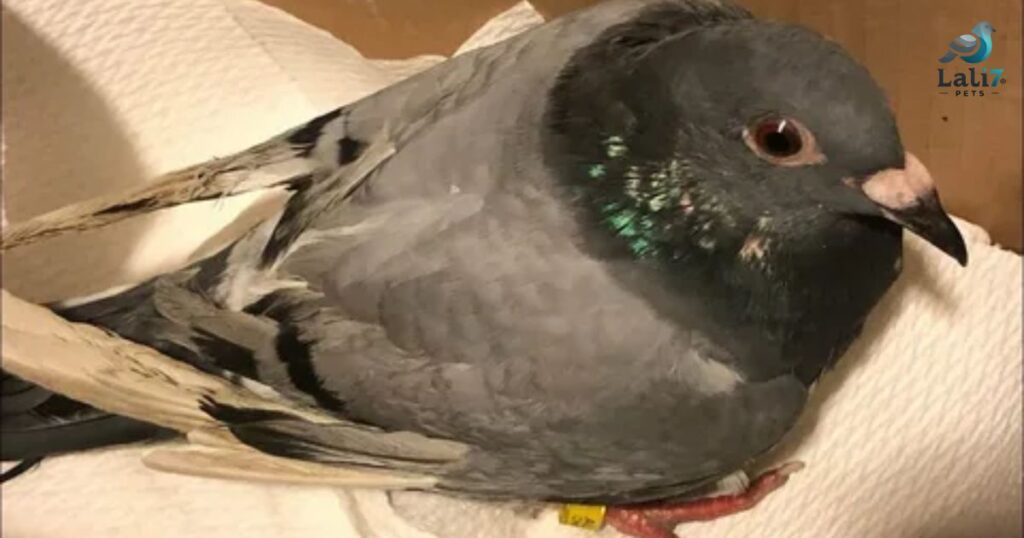
If you find an injured pigeon, follow these steps:
- Capture gently: Use a towel to wrap the bird without squeezing.
- Provide a dark, quiet box: Stress reduction is crucial.
- Warmth: Place a heating pad under half the box.
- No food or water initially: Injured birds can choke or worsen. Wait for avian vet advice.
Detailed care tips: How to help an injured pigeon.
Story: Once, a racing pigeon crash-landed near my loft. With rest, warmth, and a vet check, it recovered and rejoined its flock weeks later.
Is It Legal to Keep Pigeons as Pets?
Before adopting pigeons, check local laws.
- In most countries, keeping pigeons as pets is legal.
- Some cities may restrict large lofts or racing activities.
- Banded pigeons may belong to someone, check numbers with pigeon registries.
Always confirm with your local animal welfare authority.
Pigeon Care and Feeding
Food is the foundation of pigeon health.
Diet Essentials
- Grains: Corn, wheat, millet, safflower, peas.
- Commercial Mixes: Easy and balanced pigeon feed.
- Fresh Water: Always available.
- Supplements: Vitamins, minerals, and grit for digestion.
Feeding Routine
- Feed twice daily.
- Remove leftovers to prevent mold.
- Add supplements weekly.
Anecdote: My pigeons once became dull and inactive. After adding multivitamins, their feathers turned glossy and their energy returned.
Pet Pigeon: Bonding and Enrichment
Keeping a pet pigeon is rewarding—they are intelligent and affectionate.
- Bonding: Hand-feed treats, talk softly, and handle them daily.
- Play & Enrichment: Provide toys and perches to avoid boredom.
- Bathing: Offer a shallow tray weekly.
Story: My pet pigeon, Snowy, follows me around the house and even taps on my shoulder when he wants food, a true family member.
Daily Step-by-Step Pigeon Care Routine
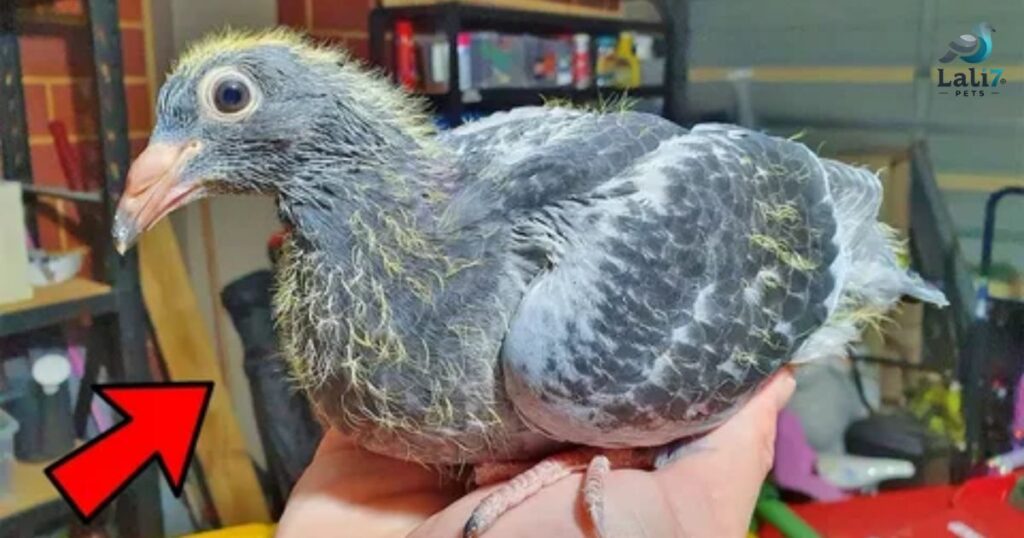
- Morning: Change water, feed fresh grains, check droppings.
- Afternoon: Allow loft flying or indoor free time.
- Evening: Clean cage/loft, refill food, ensure pigeons return safely.
- Weekly: Disinfect housing, trim nails, check for parasites.
Why You Should Feel Confident in Pigeon Care
Caring for pigeons may seem overwhelming at first, but with the right routine and reliable pigeon supplies, it becomes easy. From food to loft equipment, the right products ensure your pigeons thrive.
With proper housing, nutrition, and attention, your pigeons will reward you with loyalty, affection, and years of companionship.
FAQ: How to Take Care of a Pigeon
Is it easy to take care of a pigeon?
Yes, pigeons are relatively easy to care for as long as they have proper housing, clean water, balanced food, and a consistent daily routine.
How to get a pigeon to trust you?
You can earn a pigeon’s trust by feeding it gently from your hand, speaking softly, moving slowly, and spending time with it daily.
How to take good care of pigeons?
Good pigeon care includes providing safe shelter, a nutritious diet, clean water, space to fly, regular cleaning, and attention to their health.
What should you feed a pigeon?
Pigeons thrive on a mix of grains like corn, peas,
Final Thoughts
Learning how to take care of a pigeon is not just about meeting basic needs, it’s about creating a bond with a loyal, intelligent bird. Whether you’re raising a female pigeon, rescuing an injured one, or keeping a pet pigeon indoors, the steps in this guide will help you succeed.
Start today with small, consistent efforts, and enjoy the special relationship only pigeons can offer.

